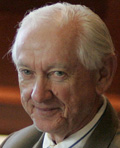Health scare alarmed federal officials
In the days after the announcement of an outbreak of hepatitis C in Las Vegas, federal health officials worried that hundreds or even thousands of Nevadans could be infected with either hepatitis or HIV and began to plan for a worst case scenario, a former government administrator said Friday.
"I was very concerned that a fear factor could stop people from getting treated by doctors, not only in Las Vegas, but possibly across the nation. And my concern was that people would not just stop getting colonoscopies, but treatment for things like heart disease and cancer, too," said Tom Lorentzen, a former regional director for the U.S. Department of Health and Human Services. He was the featured speaker at a luncheon meeting by the Nevada Biotechnology & Bioscience Consortium at McCormick & Schmick's Seafood Restaurant.
Even one case of HIV contracted during a medical procedure at the clinic owned by Dr. Dipak Desai "would have been a game changer" in how people thought about the delivery of health care in the country, Lorentzen said in an interview with the Las Vegas Review-Journal prior to his talk.
HIV causes AIDS, which has killed more than 25 million people worldwide since its discovery in 1981.
After Southern Nevada Health District officials determined in 2008 that six patients had contracted hepatitis C because of unsafe injection practices at Desai's Shadow Lane clinic, they sent out letters to 40,000 former patients urging them to get tested for both hepatitis and HIV.
"There very likely could have been a loss of public confidence in health care that would have spread outside Nevada if many more people were infected," Lorentzen said. "An HIV case would change the equation when it came to fear. It just does in the minds of people. We would have needed to bring local, state and federal officials together to find a way to re-instill confidence."
That could have meant showing people through extra government inspections at clinics and hospitals that the dangerous reuse of syringes and vials in injecting anesthesia, as was done at Desai clinics, was not routine in health care, he said.
Whether that multimillion dollar effort would have been successful, he concedes, is unknown, particularly because Dr. Julie Gerberding, then head of the Centers for Disease Control and Prevention, noted after the Nevada outbreak that what happened in Las Vegas might represent "the tip of the iceberg" of safety problems at clinics across the country.
"We were just very fortunate that more people out of those 40,000 weren't found to be infected," Lorentzen said. "I'm glad we didn't have to come up with a fully thought out plan."
No one knows how many cases of hepatitis C would have "provoked something like Hurricane Katrina or the BP oil spill, where that's all people talk and worry about," he said.
"I'm glad we didn't have to find out."
In the two years since the outbreak, nine cases of hepatitis C have been scientifically linked to Desai clinics, and health officials now say there is a high probability that 106 other cases developed from treatment there.
Lorentzen said the fast investigative work by the Southern Nevada Health District had to have played a role in keeping the number of victims down.
When he came to Las Vegas from his San Francisco office to be briefed on the situation in the early days of the crisis, Lorentzen said, he was immediately impressed. He had oversight of federal health operations in Arizona, California and Hawaii in addition to Nevada.
"These were people who really knew what they were doing," he said of Dr. Lawrence Sands, the chief health officer for the district, and his staff, including Brian Labus, the district's senior epidemiologist.
Labus told Lorentzen how investigators found an unusual cluster of cases derived from a Desai clinic and how a 25-member investigative team -- compiled from the county, the state and the federal government -- actually saw nurses engaged in unsafe injection practices.
Those nurses told the investigators they were following the instructions of Desai and other managers.
"I realized during that meeting that the local officials were handling this in the right way, that they were involving state and federal officials correctly," he said. "I was able to report to the secretary (then U.S. Secretary of Health and Human Services Mike Leavitt) that everything that could be done was being done."
During the early days of the crisis, Lorentzen said, he also visited Las Vegas Mayor Oscar Goodman and thanked him for suspending the business license of the Desai operation. Officials at other government agencies, including the state Health Division, said they didn't have the power to shut down the clinics.
Desai has been indicted on 28 felony charges including racketeering, negligence and insurance fraud. If convicted, the doctor could spend the rest of his life in prison.
"The mayor helped restore public confidence in our system," Lorentzen said. "And that was something we badly needed."
Contact reporter Paul Harasim at pharasim@review journal.com or 702-387-2908.




























